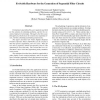Free Online Productivity Tools
i2Speak
i2Symbol
i2OCR
iTex2Img
iWeb2Print
iWeb2Shot
i2Type
iPdf2Split
iPdf2Merge
i2Bopomofo
i2Arabic
i2Style
i2Image
i2PDF
iLatex2Rtf
Sci2ools
107
click to vote
EH
2002
IEEE
2002
IEEE
Evolvable Hardware for the Generation of Sequential Filter Circuits
Evolutionary algorithms (EAs) are regularly used both for the solution of scheduling problems, and for the creation of digital circuit designs. This paper describes a unified approach, which mixes the creation of a sequential circuit, with the scheduling and binding of operations. This paper describes how Finite Impulse Response Primitive Operator Filters (FIR POFs) can be created so that they operate sequentially, over two cycles. These filters meet a frequency domain specification, and are also optimised for area and delay. The circuits that were created have a lower area than equivalent, purely combinatorial circuits. The technique described here should be applicable to other digital circuit creation problems, and to the problem of creating a sequential circuit that operates over more than two cycles. Both of these possibilities are investigated.
Related Content
| Added | 14 Jul 2010 |
| Updated | 14 Jul 2010 |
| Type | Conference |
| Year | 2002 |
| Where | EH |
| Authors | Robert Thomson, Tughrul Arslan |
Comments (0)

